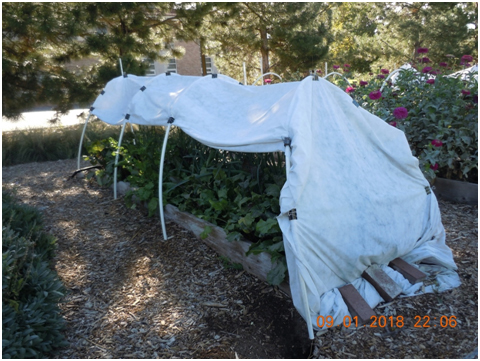Emmy Ulmschneider
Master Gardeners
By the time you read this we will be within four weeks of our predicted first freeze. We are happy about that because this has been a very hard year for those of us who love gardening. The last few years we have endured winters with hard freezes and hot summers.
Many gardeners in our area began covering their vegetable gardens when they realized this summer was going to be hard. I (Debbie — and when I say this, I mean my husband of course) plan to have a permanent roof over ours by spring. Most gardeners believe that this will be a new weather pattern for us, and we need to start preparing. But if you do not have the expertise to make a permanent structure there is an alternative: a tunnel formed by covering a series of metal or plastic hoops with a cover of spunbond fabric, polyethylene plastic, or in summer shade cloth.
Around 2015, the Natural Resources Conservation Service started encouraging producers to grow crops using high tunnels and home gardeners were quick to follow suit with low tunnels. Tunnels are not greenhouses which are usually permanent structures constructed of glass or polycarbonate and metal where plants are grown in pots above the ground. Basically, tunnels are bent metal or plastic hoops which support some sort of covering. Crops are grown directly in the ground or in raised beds. The benefits are many including extending the growing season, improving soil and plant quality, preventing erosion, and increasing soil water content. In addition, the covering can be changed to suit the season.
Low tunnels, suitable for home gardeners, are temporary structures that are approximately 4 feet tall and 3 to 6 feet wide. The spunbond fabric, polyethylene plastic or shade cloth fabric is fixed to the hoops in some manner. As temporary structures they are inexpensive, easy to move and store, and the covering can change with the season. My favorite way of fixing them to the hoops is with large binder clips. In deep freezes, you will throw a plastic tarp over the top to gain a bit more warmth. I use low tunnels year-round, and they are easy and effective! We included instructions on how to make a simple low tunnel in our blog article of Jan. 4, 2022. Here is the link:
Gardening in Winter: westtexasgardening.org/post/gardening-in-winter
In the meantime, it’s time to plant lettuce, Swiss chard and, of course, garlic. The cooler weather is perfect for lettuce and the seeds will germinate fast since our soil is still warm. If you are a beginning gardener, lettuce is perfect for you. It’s easy, and you will have the beginning of a salad within six weeks. Cover them at night if the temperatures dip below freezing. Or better still, buy PVC, binder clips and row cover and make a low tunnel to extend your harvest season.
For more information, call the AgriLife office at 498-4071 in Odessa or at 686-4700 in Midland or visit aggie-horticulture.tamu.edu or westtexasgardening.org.




